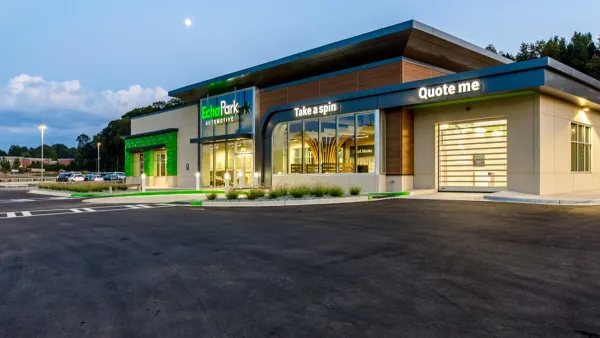Editor's note: This story is part of the WardsAuto digital archive, which may include content that was first published in print, or in different web layouts.
The Mississippi Delta town of Osceola, AR, once was known as Plum Point, which Mark Twain called “famous and formidable” in his book, Life on the Mississippi.
The town, one hour north of Memphis, changed its name to Osceola in 1938. After the lumber and cotton markets had run their course, a number of manufacturers in various sectors called Osceola home. “We thought we'd never see another poor day,” says Mayor Dickie Kennemore.
But the mid-1980s brought economic hardship as several manufacturers pulled the plug on their Osceola operations, including Fruit of the Loom and Siegel-Robert Inc. In one week in 1984, three plants shut down, including two on the same day. “We lost 1,700 jobs in one week,” Kennemore says.
It got worse. A U.S. Air Force base closed in 1991, forcing 3,500 airmen to abandon the town, which today has about 8,200 people. “I don't know about the rest of the country, but we were in a depression,” Kennemore says.
The town was exuberant in 2002 when it learned Japanese supplier Denso Corp. was considering it for a manufacturing plant to produce vehicle heating, ventilation and air conditioning (HVAC) modules and radiators.
The supplier says Osceola turned out to be the best location because of its proximity to a growing array of auto assembly plants in the South. Shipping HVAC units from Denso's only other module plants in Canada and Michigan to these Southern locations was presenting overwhelming logistical challenges.
Denso broke ground in July 2003 and by October 2004 was shipping radiators for heavy vehicles to Caterpillar Inc. Denso executives and Arkansas representatives gathered for official dedication ceremonies last month at the $35 million facility.
Plant President Jerry McGuire, who moved from Denso's HVAC manufacturing plant in Battle Creek, MI, to start up the Osceola facility, estimates the radiator operations are running at a mere 50% of capacity, but that figure will rise quickly as other Caterpillar business ramps up.
The plant produces 150 radiators a day, and output for the first year is about 37,000 units. At full capacity in 2008, Denso expects Osceola to produce about 70,000 radiators per year. There are no plans to make radiators for smaller light vehicles.
The more active side of the plant, which is running at about 80% capacity, manufactures HVAC modules for the Toyota Sienna, Sequoia and Corolla and Honda Odyssey. For the minivans and Sequoia, Osceola produces the traditional HVAC module that is integrated in the instrument panel as well as a separate module placed above the headliner or behind the body side panels for rear-seat occupants.
The newest HVAC customer for the plant is the Odyssey minivan, which is produced 250 miles (400 km) to the southeast in Lincoln, AL.
The Toyota business, however, was transferred from Battle Creek to Osceola, to make room for new business in Battle Creek, McGuire says.
The plant produces 2,600 HVAC units a day on five assembly lines with two shifts, at a current annual rate of 655,200 units. At full capacity in 2008, Denso expects the plant to more than double output to 1.5 million HVAC units per year.
A sixth assembly line will be added within the next year to produce HVAC modules for the next-generation Toyota Tundra pickup, which will be manufactured more than 600 miles (965 km) away in San Antonio, TX, beginning next fall.
Denso is Toyota's No.1 supplier. The auto maker also holds a 24.8% stake in the company. So when Denso announced plans to build in Osceola, industry observers assumed the facility would supply the new Tundra plant. But even at the recent dedication, Denso officials say Toyota has not confirmed definitively that Osceola has the HVAC contract for the next Tundra.
Toyota officials attending the grand opening tell Ward's they are “90% certain” Osceola will win the business, but that the contract formalities need to be finalized.
The plant also ships 100 Corolla HVAC units each day to Japan.
Charting growth in the HVAC segment in the U.S. is difficult for suppliers, given that nearly all U.S. cars come equipped with air conditioning as a standard feature or a high take-rate option.
Denso's strategy is to “develop more sophisticated air conditioners that are more compact,” Denso President and CEO Koichi Fukaya tells Ward's.
Next-generation systems, he says, may not require any fiddling with knobs but instead could use sensors to determine the optimum cabin temperature.
In addition, Denso continues pursuing more environmentally friendly carbon dioxide-based refrigerant for AC systems, to replace the R134a refrigerant currently used.
Denso supplied Toyota with CO2 AC systems for 25 experimental fuel-cell vehicles, but the system is too expensive for volume production.
Even if the North American AC market is not growing by volume, Denso plans to introduce new technology that will allow the supplier to add more engineering value to the component, Fukaya says.
The Osceola plant employs 360 people, and the starting wage is just under $10 an hour, McGuire says. Employment is expected to reach 500 by 2008. Japanese managers will leave the plant in 2007.
Today, Mayor Kennmore is grateful to have Denso in town. “Denso has lifted our spirits and has raised our standard of living,” he says.
Incentives offered by the state and regional economic development authorities made Osceola even more attractive.
Denso qualified for income tax credits, sales and use tax refunds, payroll rebates, infrastructure assistance and training incentives. Neither Denso nor local officials will disclose the specific amount of those enticements, however, saying state law does not require public disclosure.
The Arkansas Department of Commerce awarded a $1.5 million economic-development grant to the city of Osceola for infrastructure improvements.
Denso says the decision to locate in Osceola was not driven by financial incentives.
Osceola officials hope Denso has started a trend that will bring more manufacturers to the area.
Already, a key Denso supplier, Systex Ltd., which produces blower motor housings for HVAC units, has opened a plant next to Denso's Osceola facility. Systex also has a similar plant in Battle Creek.








